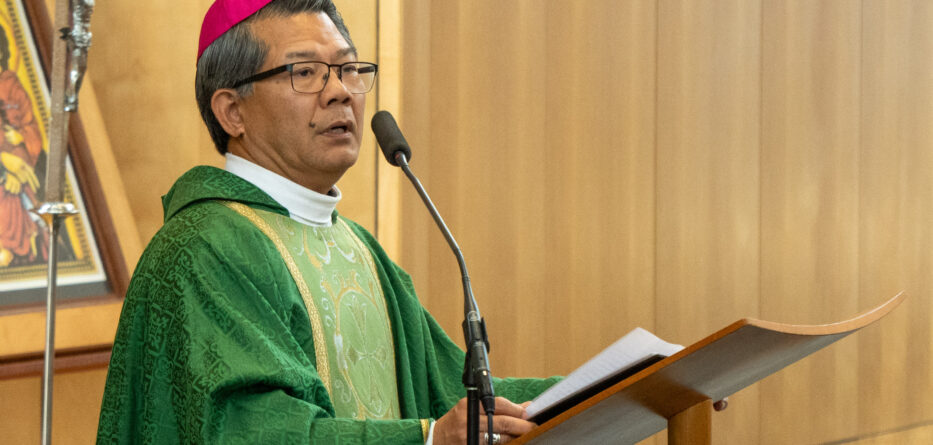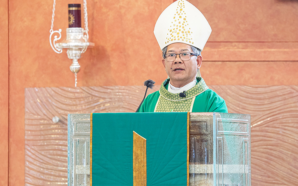Most Reverend Vincent Long Van Nguyen OFM Conv DD STL, Bishop of Parramatta
Homily for the 15th Sunday in Ordinary Time
Readings: Deuteronomy 30:10-14; Colossians 1:15-20; Luke 10:25-37
Learning to operate out of Jesus’ radical outreach and inclusion
Dear friends,
We live in a world that is increasingly fragmented, polarized and sadly self-preoccupied. We see this fragmentation and self-preoccupation manifested in the collapse of global order, the lack of solidarity and especially the scapegoating of the marginalized minorities.
As disciples of Jesus, we are called to be a countercultural force -a community in which public responsibility and the common good are front and centre. The whole thrust of the biblical narrative is a divinely inspired movement against the world’s winners-take-all modus operandi. Following the God of the Covenant and inspired by the compassion of Jesus, we are committed to build a community that lives by the power of the Crucified and reflects the radical love of the One who identified with the outcasts and expendables.
This is the essence of the scriptural lesson for this Sunday. In the first reading, Moses instructs the people as they are about to settle in the Promise Land. After the enemies have been routed, they enjoy a period of peace, stability and prosperity. There is a real temptation, however, to grow comfortable and forget that they are the People of God in mission.
Moses warns them against settled securities and reminds them of the covenant relationship that would define them as the chosen people. He tells them: “Obey the voice of the Lord, keep his laws and commandments and you shall return to him with all your heart and soul”. The Israelites are to set themselves apart from the other nations and peoples around them. Just as they were not to model on the oppressive society under Pharaoh in Egypt, now in Palestine they must distinguish themselves as an alternative community of hospitality, compassion and care for the most vulnerable. The emphasis on observing the commandments with all of one’s heart and soul is found in traditional Jewish daily prayer called the Shema. It reinforces their commitment to make God and his concern the centre of their life.
This is also fundamentally the message of Jesus. In the Gospel reading, he reiterates the Shema, that is, the command to love God with one’s whole being, but then immediately couples it with the command to love one’s neighbour as oneself. The two are bound together in a way that one gives shape and expression to the other.
The parable of the Good Samaritan challenges us to recognize and honour God in the most vulnerable. However, more than fulfilling the Mosaic law of love thy neighbour, Jesus teaches us some home truths that are truly confronting and incisive. Samaritans were considered outsiders and outcasts by ordinary Jews. Yet in the parable, it was the Samaritan who was the unlikely hero. For he showed love and compassion to the person in need as opposed to the priest and Levite who failed the test of human solidarity.
Thus, in crafting the characters in their cultural and religious context, Jesus challenged the prevailing assumptions and stereotyped attitudes. He turned the presumed order of moral goodness upside down. The holders of tradition failed the test of neighbourliness while the outcast proved himself an unlikely champion of basic human decency, mercy and compassion.
We can no longer understand the parable only in terms of being kind to those in need. It is an incisive lesson that cuts our prejudice to the quick. The God of the Samaritan challenges the merit-based system and the sense of entitlement. He invites us to a new the whole new way of living and relating. The parable is the paradigmatic story of reversals: the outsider became the insider, the outcast became God’s favoured, the last, first. If God acts outside the narrow confines of our religion, race, ethnicity and culture, then we must learn to operate out of his radical outreach and inclusion.
Dear friends,
Throughout Jesus’ ministry, we can see the way he expanded the idea of a neighbour. In his embrace of the consummate outsiders, he embodied the God who loves without limits. It is this radical love that the true cost of our discipleship is counted, because we dare to walk with the Samaritans of our time. Ultimately, we are challenged to prod at our own sense of security and to stretch our capacity to love. For that is where the God of solidarity calls us to be.
The kingdom vision of Jesus guides us as we endeavour to be a force of solidarity. In the world where strength, domination and elimination of those considered expendables and outcasts seem to gain momentum, we must not fail to resist hatred, violence and indifference. May we enact this vision individually and as a Body of Christ by lives built on love, pivoted to justice and animated by mercy. Then, we too may hear the encouraging words of Jesus to the scribe “You are not far from the kingdom of God.”








